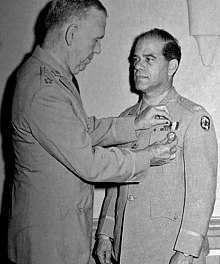The Wall Street Journal had an interesting article on the Frank Capra film It’s a Wonderful Life. It seems this Christmas classic was a financial flop when it premiered in 1946. In fact, Capra’s production company Liberty Films took a loss of $25,000 – $400,000 today.
To recoup their losses, Capra and his three partners sold the company to Paramount Pictures in 1947. Among the assets Capra sold with Liberty was the movie rights to I Remember Mama – the 1948 tribute to Norwegian Americans which went on to enhance that community’s image as a television series from 1949 to 1957.
For his own people, Capra did nothing that grand except to insert some positive Italian immigrant characters in It’s a Wonderful Life. Capra characterized himself as a 10% Italian/90% American. Actually, he was born in Palermo to Italian parents and came with them to Los Angeles at age 6, where his father grew fruit. But Capra soon broke with tradition and assimilated, going to college against his parents’ wishes and avoiding the orchard. He studied chemical engineering but was drawn to filmmaking.
It’s a Wonderful Life was “the greatest film I ever made,” Capra acknowledged later in life. The film has so many elements of the human experience in it that the Christmas segment only comes at the end. It’s a story of childhood tragedy, of teenage love, of school days, and nostalgia for a pre-war America. Ultimately, it’s about the financial world and redemption, with a miracle thrown in. The real miracle was how the film rose from obscurity to a national icon.
On completion, Liberty Films took out a 28-year copyright. The movie went nowhere after its theater run and neither Capra nor Liberty’s successor Paramount bothered to renew the copyright in 1974. It’s a Wonderful entered the Public Domain – no royalties to pay for broadcasting it. With the television era, broadcasters were hungry for films with cheap or no royalties. So, from 1974, and every year thereafter, the American public was given an uplifting Jimmy Stewart movie every Christmastime. The film grew on us, becoming a holiday classic.
There’s another side of Frank Capra’s filmmaking that makes our community proud of him – his service to his country. Before he made It’s a Wonderful Life, Capra was famous for Depression-era films like Mr. Smith Goes to Washington (also starring Jimmy Stewart). These films captured the heart of America that roots for the common man and the triumph of good over evil, feel-good movies that are arguably cultural propaganda. So, when war broke out in 1941 Capra was the director of choice for U.S. Army training films.

General George Marshal
receiving one of many
national honors.
He had served in the Army at the end of the First World War in order to obtain his American citizenship, which he received in 1920. He rejoined after Pearl Harbor and eventually rose to the rank of Colonel. He famously produced Why We Fight, a multi-part training film to motivate recruits by showing them how the war had started and what the enemy was like – including Italy’s Fascist dictator Benito Mussolini.
President Franklin Roosevelt was enamored with Capra’s body of work. He ordered Prelude to War – the story of Axis aggression prior to 1941 – to be shown in every movie house across the nation. Capra was churning out morale-boosting films that were just as important as producing planes, tanks and ships.
In 1944, Capra produced The Negro Soldier, a rousing 40-minute film that would make Blacks proud to watch today. Of course, it left out any mention of slavery, Jim Crow, or racism in the military. Black soldiers are portrayed as an integral part of American victories, from the American Revolution to the fighter pilots over Europe. The film crescendos with Gospel songs and marching units of Black troops.
Capra’s The Battle of Russia became an instant favorite of Josef Stalin, who watched it in Moscow without waiting for Russian captions or dubbing. Winston Churchill ordered the Capra series shown in British theaters. Naturally, with war’s end and the Iron Curtain, The Battle of Russia was banned in the U.S.
The Cold War also caused the FBI to revisit Capra’s theatrical films for traces of socialism or anti-capitalism. The malevolent banker in It’s a Wonderful Life came under scrutiny; one FBI agent even referred the film to the U.S. House of Un-American Activities Committee. The committee sanely chose not to subpoena Capra. -JLM

Only God knows the trials and tribulations in most people’s lives.
Frank Capra is no exception but, in his case, he had many successes.
By my standards one the most compelling Capra film pitting the avaricious commercial industry against the common man was the 1941 “Meet John Doe”. It also has the Christmas backdrop about a letter of suicide attempt on Christmas Eve. Barbara Stanwyck as a headstrong newspaper woman, Gary Cooper set up as the suicidal John Doe and requisite cast of “meanies” of the day create a prescient film about the power structure of the world. Must viewing. Bill, our film buff expert I’m sure would concur.
Thank you for the article. Of course it’s my favorite film.